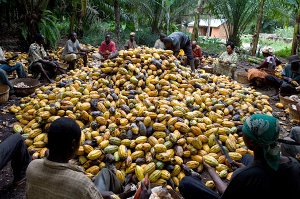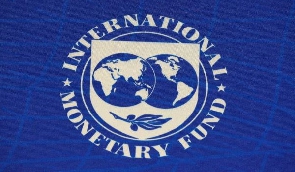- Home - News
- TWI News | TV
- Polls
- Year In Review
- News Archive
- Crime & Punishment
- Politics
- Regional
- Editorial
- Health
- Ghanaians Abroad
- Tabloid
- Africa
- Religion
- Election 2020
- Coronavirus
- News Videos | TV
- Photo Archives
- News Headlines
- Press Release
General News of Thursday, 30 November 2000
Source: GNA
Government asked to withdraw subsidies on cocoa inputs

 The Cocoa Research Institute of Ghana (CRIG) on Wednesday asked the government to speed up the pace of liberalising the cocoa inputs markets, including complete removal of subsidies and continue with current economic policies despite the hostile global environment.
The Cocoa Research Institute of Ghana (CRIG) on Wednesday asked the government to speed up the pace of liberalising the cocoa inputs markets, including complete removal of subsidies and continue with current economic policies despite the hostile global environment.
At a workshop on Emerging Agricultural Production Inputs in Accra, Dr Ernest George Asante of CRIG said government should also encourage the Ghana Cocoa, Coffee and Sheanut Farmers Association (GCCSFA) to sell shares in the Cocoa Inputs Company Limited (CIC) to cocoa farmers.
This would mobilise capital and encourage co-operative credit programmes for farmers.
More than 40 researchers, policy makers and civil society activists are attending the workshop organised by the Reseau Ghaneen of SADOAC.
SADOAC is a programme within the Institute of Statistical, Social and Economic Research initiated in 1989 by the Ministry of Foreign Affairs to develop new structural approaches for improving food security in Central/West Africa by strengthening local research capacity and stimulating high quality research that supports policy design and implementation.
Dr Asante recalled that as part of the cocoa rehabilitation programme all subsidies on inputs were to be removed starting in 1988 and the private sector was to distribute inputs. He said the re-organisation did not take place and over time real values depreciated and subsidy rates increased.
The input subsidies include fertilisers, seeds, fishing nets, feed mills and day old chicks.
Dr. Asante said a task force formed in 1994 found that low farmer income due to low producer prices, poor farm maintenance, inadequate inputs and suspected smuggling across the borders led to reduced levels of cocoa production.
He said current statistics show that the supply of cocoa inputs far outstrips demand and stocks are carried over from year to year despite the escalating subsidy rate.
In spite of the subsidy, farmers cannot afford the inputs, he said, and "with such a small market it is not surprising that other private companies are not willing to enter the market directly."
Dr Asante suggested that government should reduce the large budget deficit, high inflation and severe drain on foreign exchange reserves to ensure reasonably stable prices of inputs. Also most goods and services must be bought and sold through market mechanisms as well as competition either domestic or from abroad.
He said relative prices should reflect relative scarcities in the economy to get prices right, adding that firm managers, farmers and other decision makers should be willing to respond to market signals by increasing sales to maximise profits, cut costs and price supports to increase economic efficiency.
Through the extension services, government could provide market information on cocoa inputs and prices for entrepreneurs and farmers, including information on the benefits from use of cocoa inputs.
Mr Lambert Lans Delimini, Head of the Seed Implementation Division of the Ministry of Food and Agriculture, said there are not enough seed distribution points in the country. For the 110 districts, there are only 158 seed dealers.
He said apart from the market not developing fast enough to make planting products accessible to growers, there is also the problem of transporting bulky planting materials.
Mr Delimini called for a review of the national seed industry to enhance and strengthen private sector participation.
He called for the establishment of minimum standards of certification of local varieties of vegetable crops and incentives for the public sector breeders in the long term.










